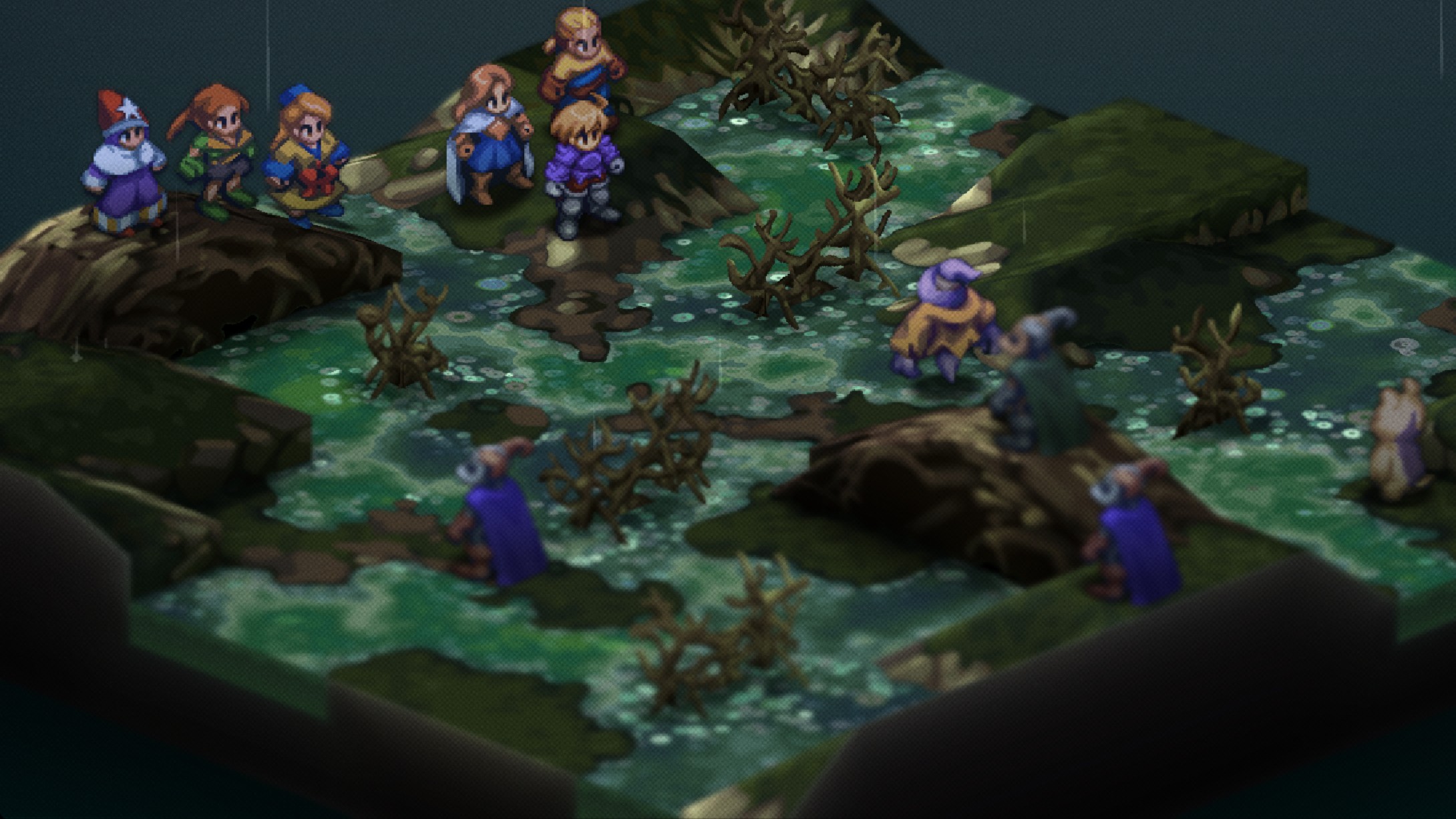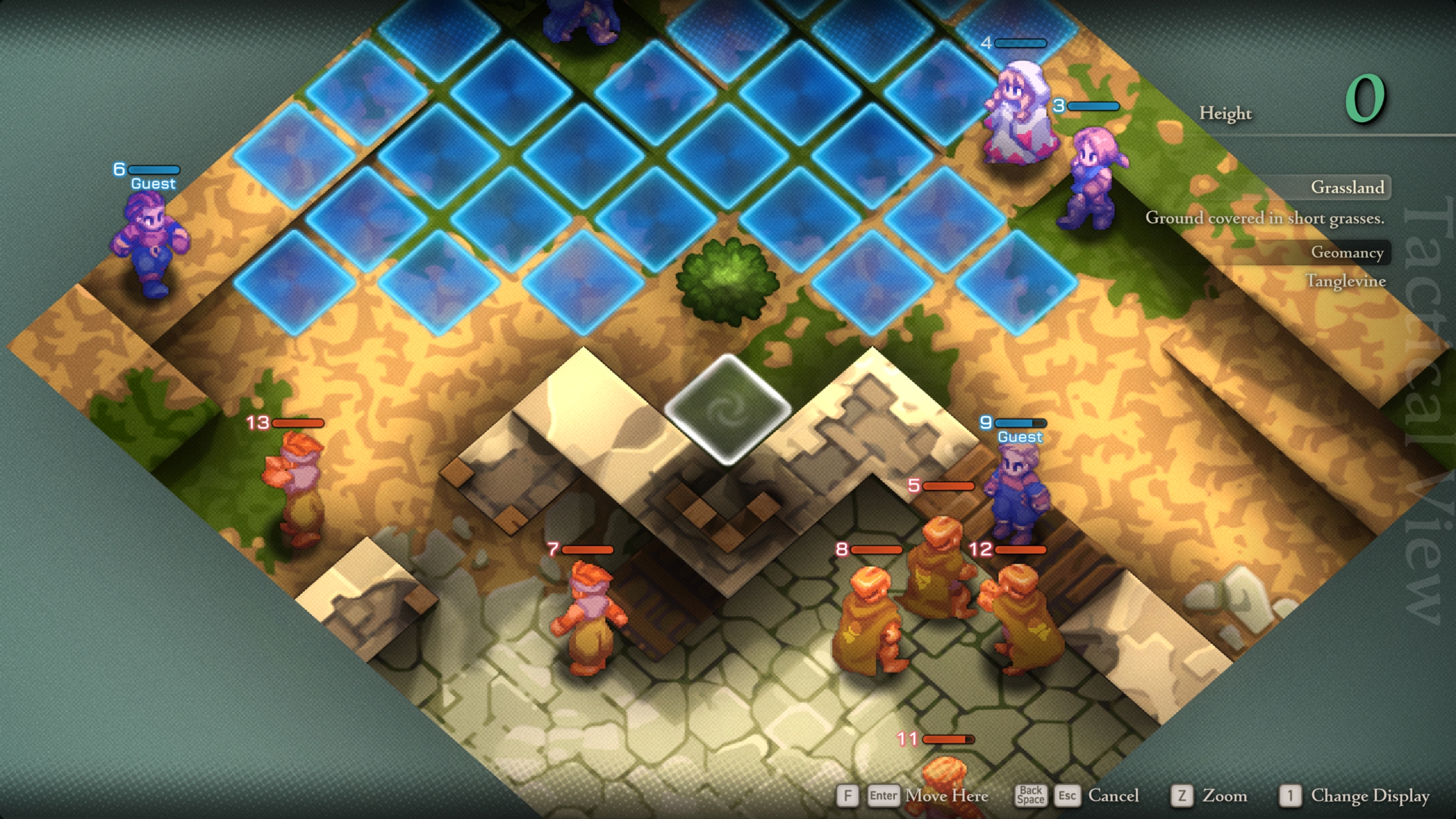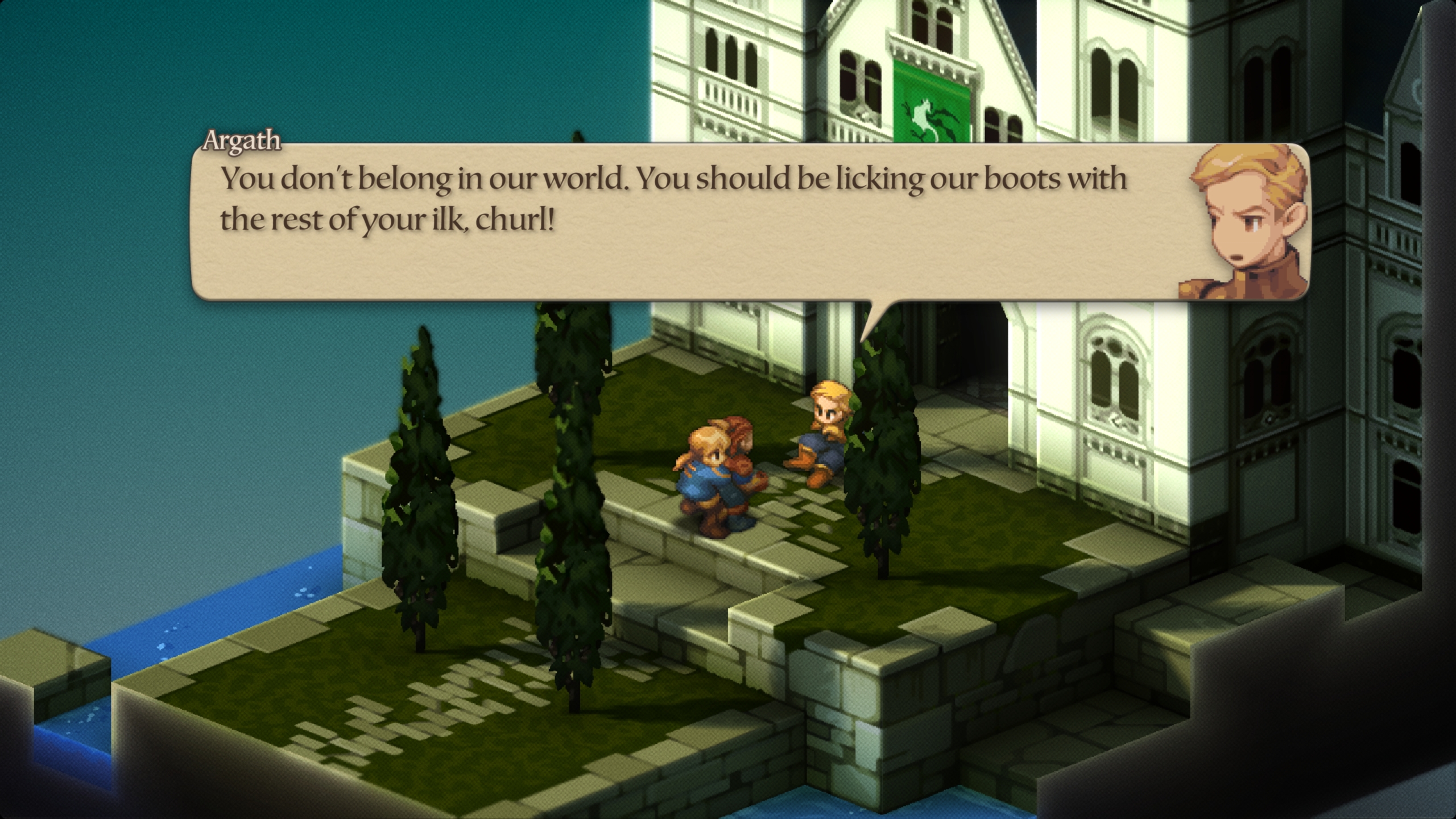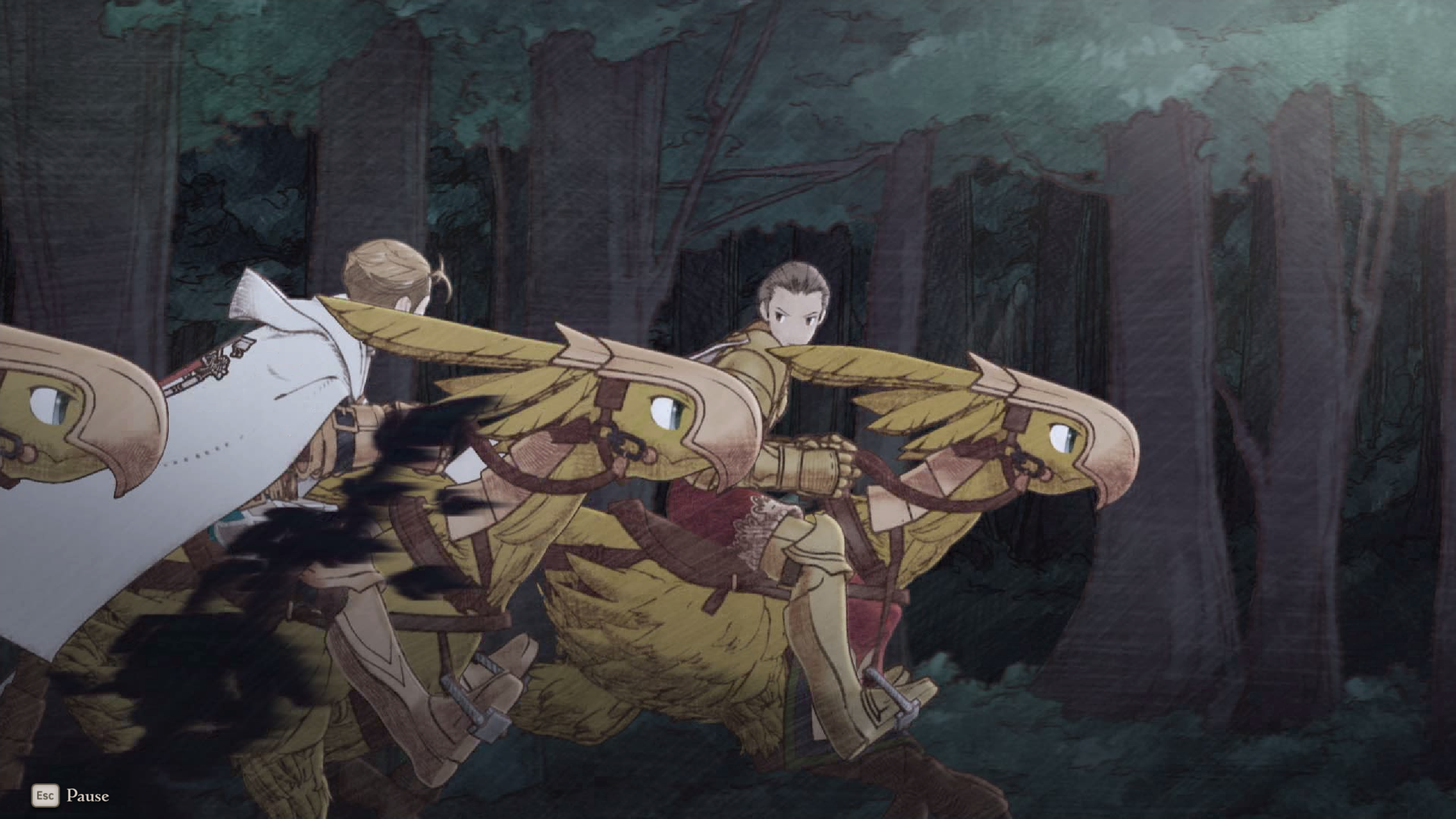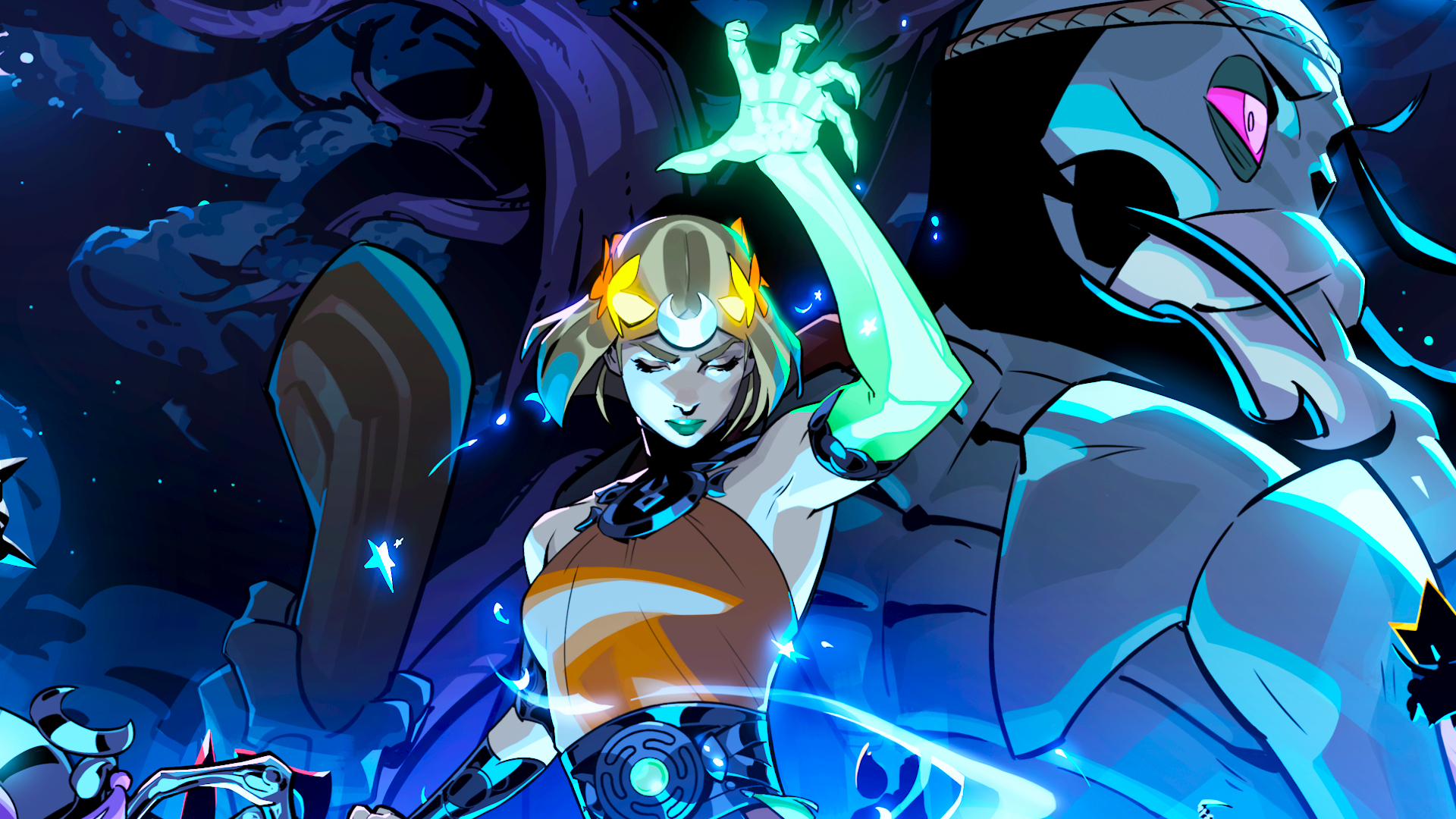Our Verdict
This is an extraordinary remaster of an essential RPG, and as unmissable today as ever.
PC Gamer's got your back
Somebody pinch me. They've done it. They've actually done it: Not only can I finally play Final Fantasy Tactics on my PC, but this timeless classic has been done justice. It's not some old game hastily shoved in an emulation wrapper and sent out to die. It's not some brand new thing so polished and changed it feels ashamed of its heritage, either. It's simply everything I had hoped for.
What is it? One of the finest strategy RPGs ever made, now on PC.
Release date: September 30, 2025
Expect to pay: £40/$50
Developer: Square Enix
Publisher: Square Enix
Reviewed on: Intel i9-13900HX, RTX 4090 (laptop), 32GB RAM
Multiplayer? No
Steam Deck: Playable
Link: Official website
I dived into the classic mode first, keen to see how the decades-old strategy game I first fell in love with on a PlayStation had been recreated for modern hardware. Here polygonal edges are rough and raw, the pixels in every sprite are so large I can count them, and the pre-rendered movies are old enough to buy their own drinks. It's unvarnished in a respectful way, as if it were an ancient relic to be handled with great care.
Satisfied there was a nigh-perfect recreation of Tactics to retreat to whenever I needed an authentic dose of Old, I then ploughed ahead with the completely separate remaster—and ended up even happier than I already was.
Made in heaven
I know "timeless classic" is an overused phrase, but I think it's the only one that accurately describes this game. It's a thrilling political and personal drama where every revelation quickly leads to another heartbreaking tragedy. It's a fantastic twist on Final Fantasy's traditional job system, encouraging me to hand-craft a small team of battle-ready specialists. These halves come together beautifully, every fight part of a story, every story leading to a fight. It's no wonder so many indie PC RPGs still try to recapture the feel of everything from its tactical skirmishes to its gorgeous art.
So I approached its visual changes with some trepidation. I'm not normally a fan of smoothing out or sharpening up low resolution textures, and The Ivalice Chronicles does both. However, instead of merely smearing all the art, making corners so sharp I could cut myself on them, and calling the end result "HD", what's been achieved here shows a great deal of care and respect for the original work.


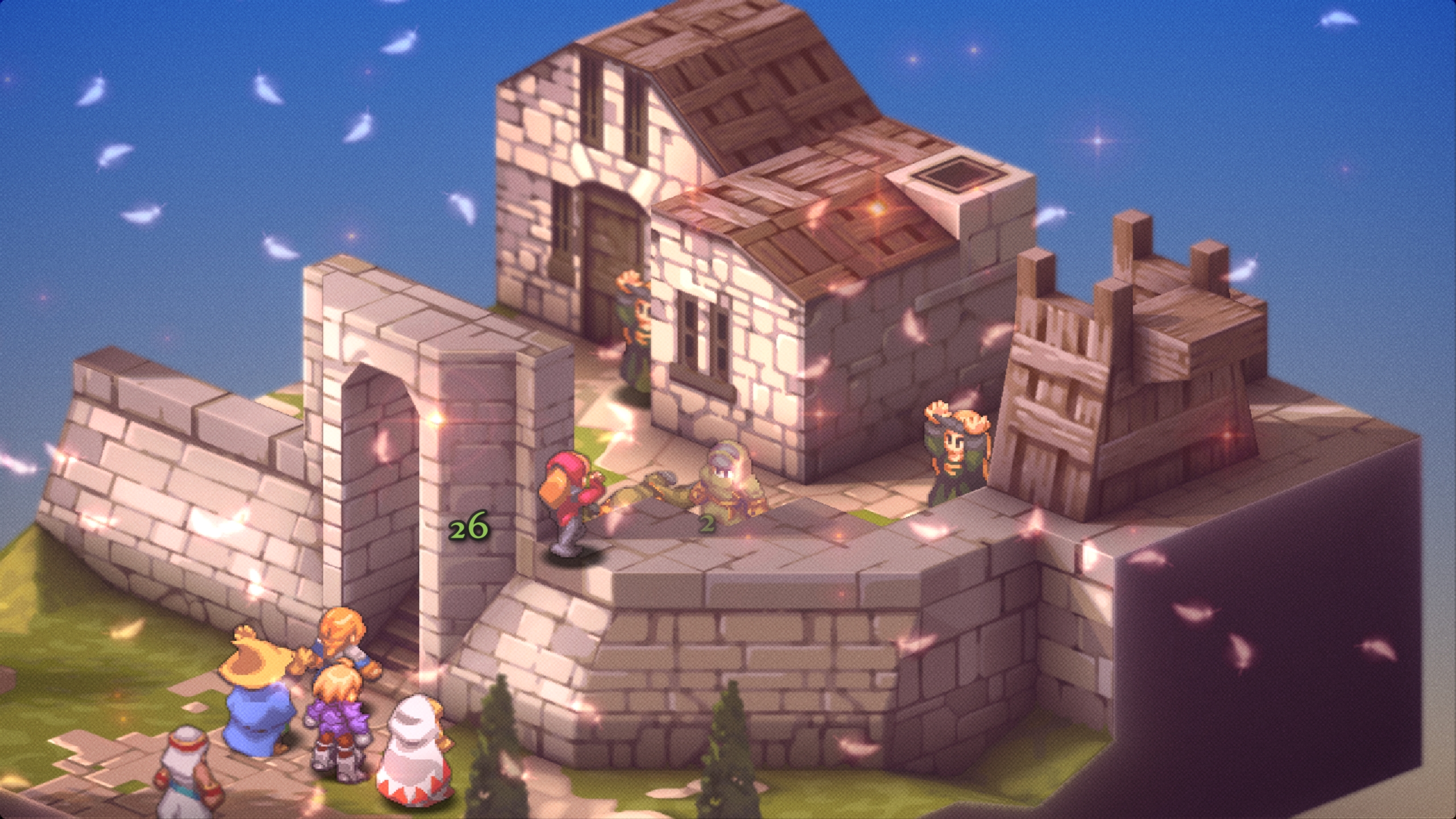
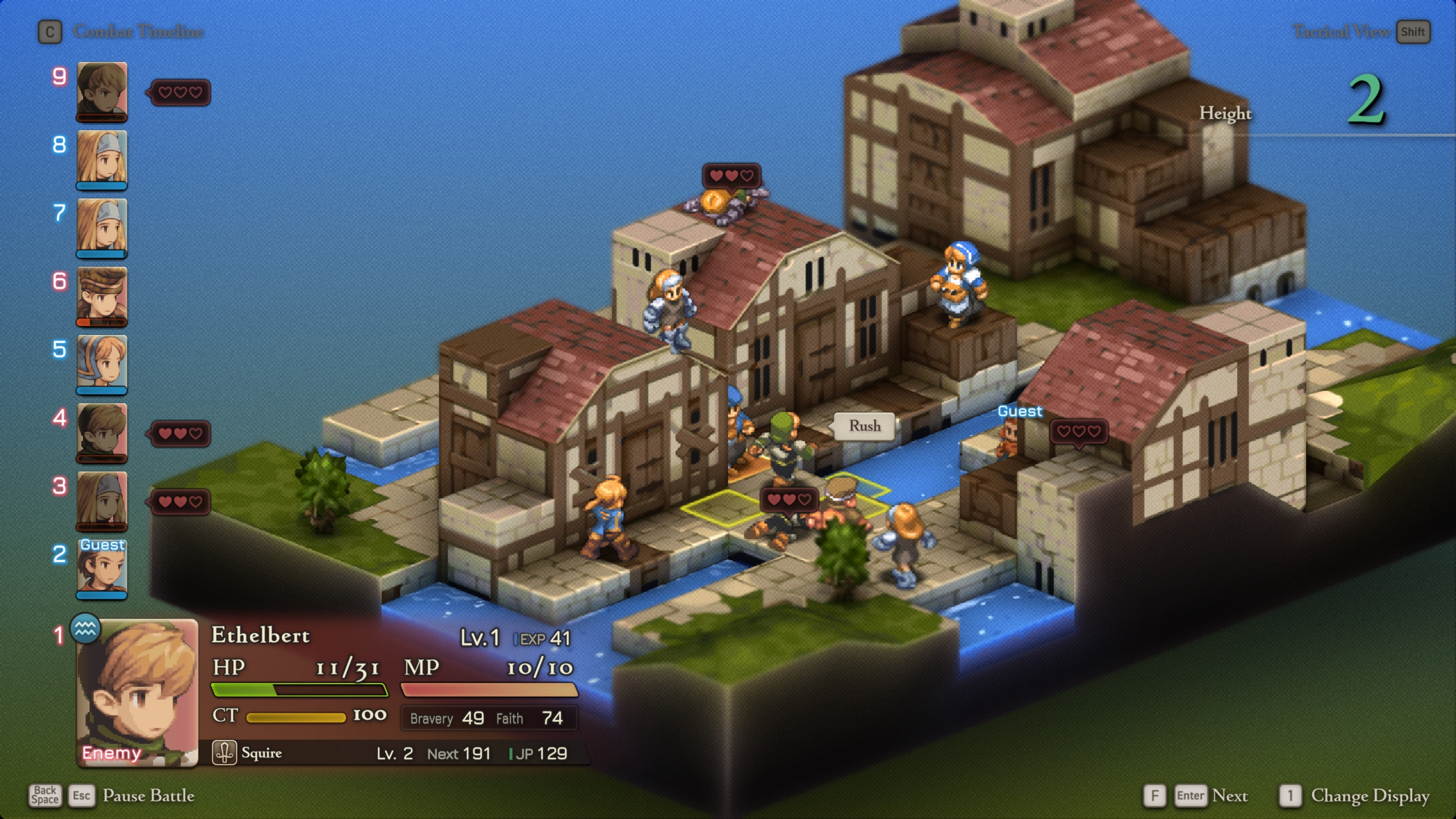

Lightly bevelled edges work in harmony with a subtle noise filter, creating just enough coarseness to tie the smooth 3D environments and flat 2D sprites together. An optional soft focus effect turns every battlefield into a handcrafted diorama. It's all instantly recognisable and true to the spirit of the original, while still looking crisp on modern displays.
I expected the freshly recorded voice acting heard during cutscenes to be expressive, but I didn't expect the all-new in-battle lines for even generic units to bring as much personality to the game as they do. My White Mage was automatically assigned a surly voice, often responding with a curt "Wot?" when selected. This simple coincidence transformed what used to be "some healer" into an enjoyably abrasive character, a fun contrast to all the sparkly divine magic she dished out.
Keep up to date with the most important stories and the best deals, as picked by the PC Gamer team.
Even my opponents are better for the new banter. A reused floating human sprite with an undead tag really does feel more believably ghostly when they open their turn with a monstrous groan instead of a voiced line. The game's honestly better for it.
Under pressure
Additional assistance is everywhere I look in battle, making it easier to make good, tactical decisions
The battles themselves remain blissfully untouched: Final Fantasy Tactics is as unrelentingly deep as it's always been. Height and depth and even rocks jutting out of the ground need to be taken into consideration.
Because every detail matters, right down to the type of ground beneath my feet, it's easy to believe I really am out here in the baking desert, or fighting in a deep forest while it's raining. Swamp water isn't just a sickly colour; it's poisonous to touch, and if I'm not careful I might leap into a too-deep pool and have a tough time getting out.
Wherever I am, there's always some dangerous snag to watch out for or some clever trick to exploit: a high vantage point that will give my archer an edge or a troublesome enemy I can stop with magic while I work on thinning out the rest of them. There's a lot to keep track of all the time, right down to which direction someone faces at the end of their turn.
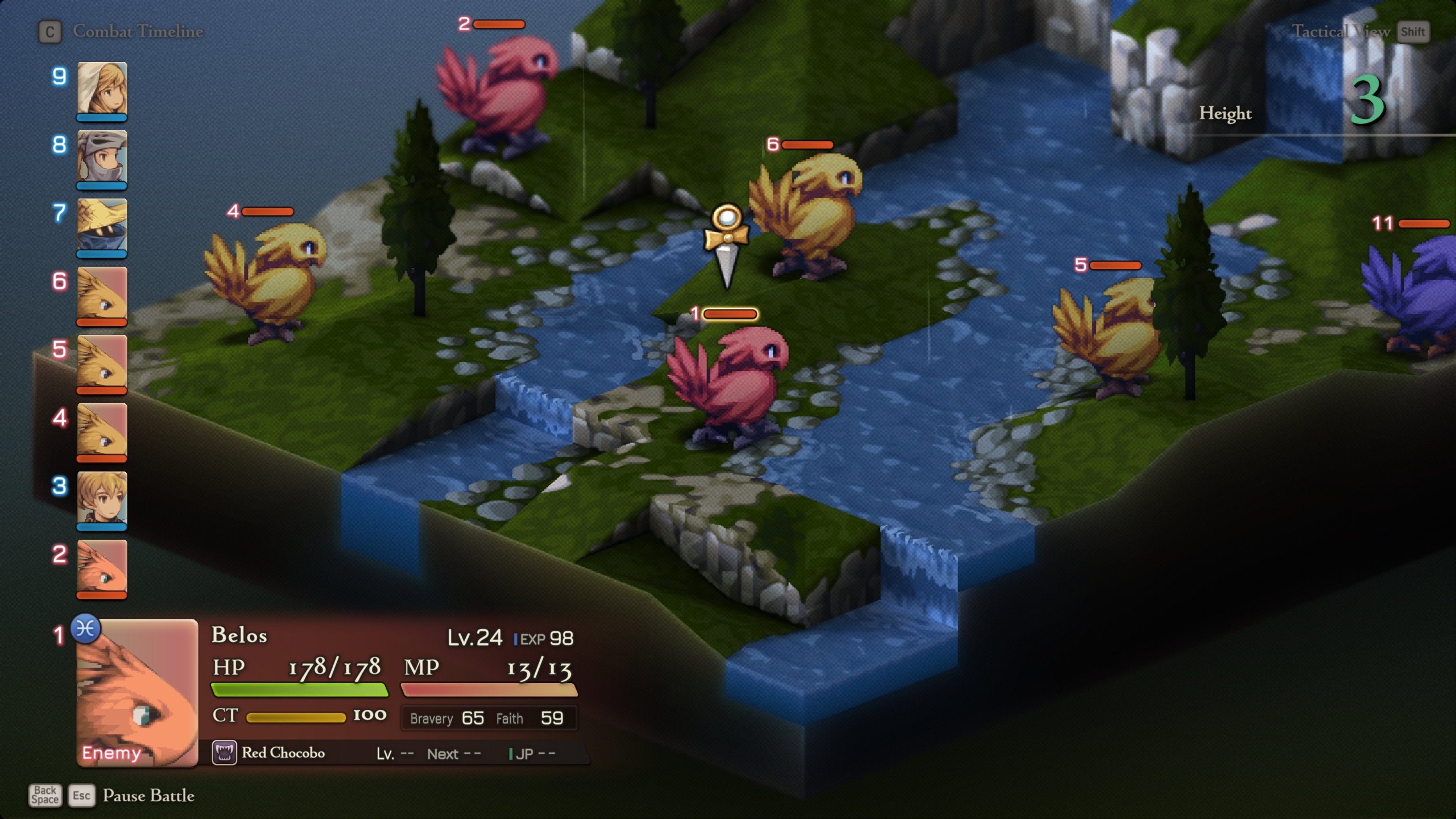
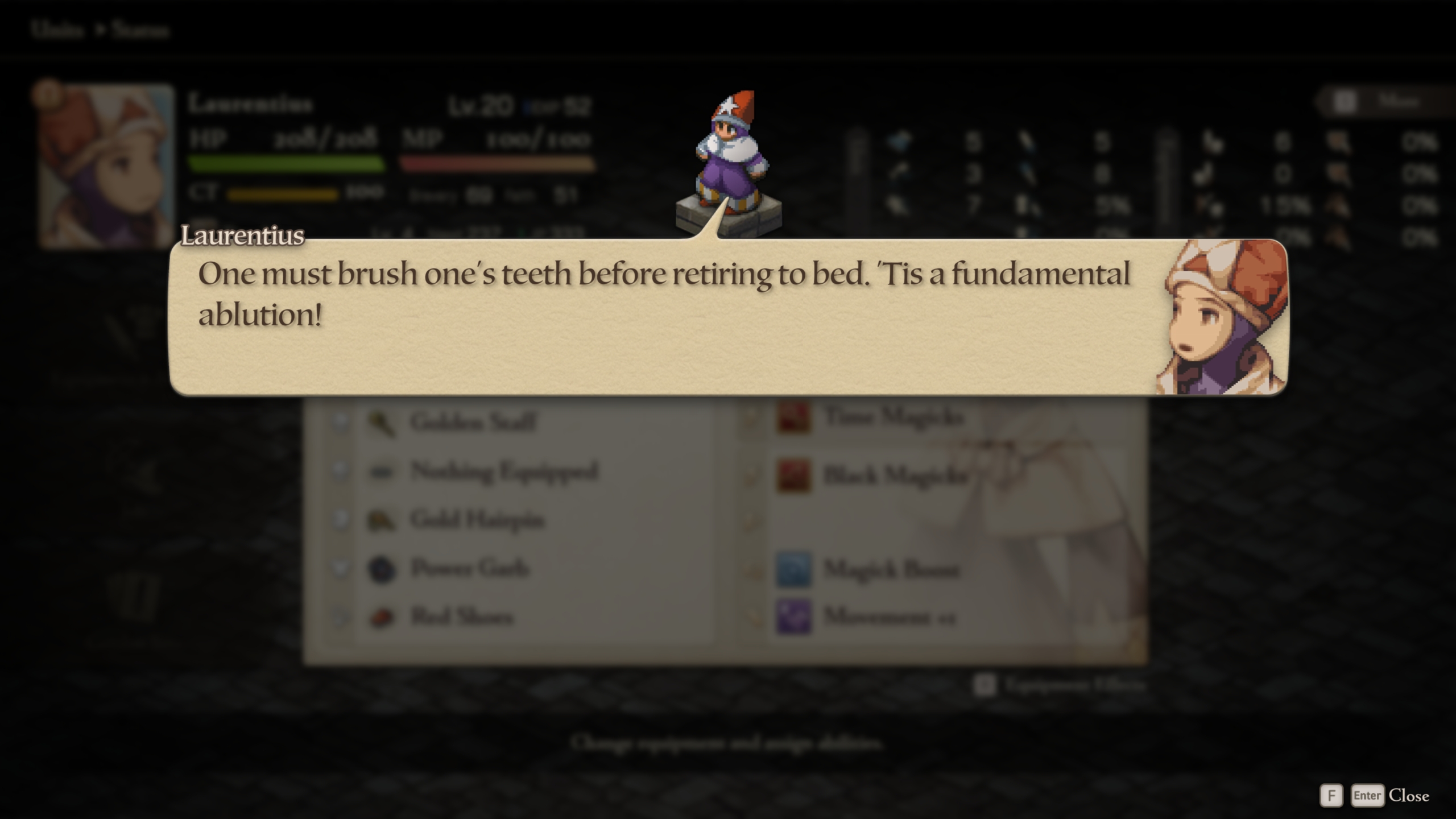

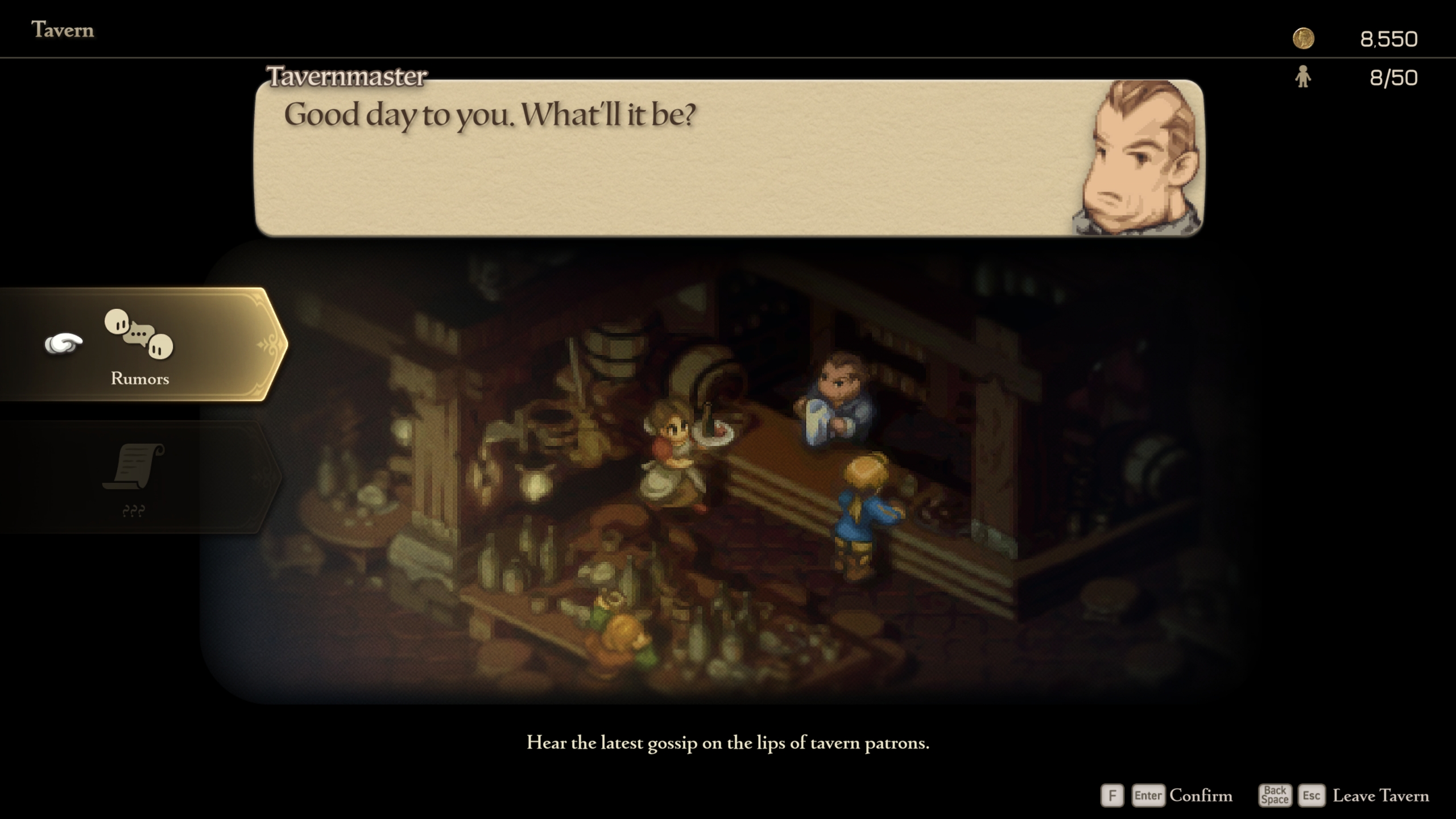

The difference is how much effort the remaster puts into helping educate and inform players. For the first hour or so I can't sneeze without another concise tip turning up, covering everything from basic menu commands to the purpose of an outfitter's fitting room. Newcomers, or even those that have simply been away for a while—the original's almost 30 years old, after all—get context-sensitive help whenever something new comes up, and experts can dismiss these screens as quickly as they appear.
Detailed tutorials on every subject under the sun are accessible whenever our hero, Ramza, is sitting on the world map, but thanks to these organic pop-ups they become optional extra help rather than mandatory homework.
Keep yourself alive
Additional assistance is everywhere I look in battle, making it easier to make good, tactical decisions and fully enjoy the interlocking job/skill learning/equipment systems. At the start of each fight I'm now invited to place my formation directly onto the field rather than on an entirely separate (and not especially helpful) generic deployment screen.
As movement can now generally be undone, I can try to find the perfect spot for a spellcaster to sit or test a ranged character out in a few different places, learning through playing how the landscape interacts with each job's skillset.
The turn order bar running down the side of the screen allows me to see at a glance exactly when a crucial healing spell will kick in, or if an enemy has a chance of killing off my archer before their lengthy aimed attack is unleashed. A new overhead tactical view makes it so much easier to understand my surroundings and reposition my units without having to constantly spin the camera, and even integrates per-tile magical terrain information—essential knowledge for any would-be geomancer—into this point of view.
This knowledge was always in the game somewhere, but its accessibility now means combat flows better than it ever did before. I find myself clearly remembering—and then actually using—small bits of information I was once only vaguely aware of and could never quite be bothered to look up.
If that's not enough to keep my party alive I can always fall back on a small set of frequently updated autosaves, or retry a battle from the start if things aren't going well. The latter even allows me to alter my formation and their equipment if it turns out a particular setup is about as useful as a cocktail umbrella in a thunderstorm. And there's no fear of saving myself into an unwinnable position anymore, thanks to the option to warp back out to the world map any time I need to (minus any XP, progress, or items acquired).
However deep into a tough string of battles I am, I know I can always escape and come back better prepared later. Personal experimentation is warmly welcomed and encouraged, and always more satisfying than rummaging around someone else's guide for answers.
Or I could swap between a trio of all-new difficulty levels any time I'm not in the middle of a fight. The default (Knight) is generally balanced and fair, but if I've built a dual-wielding super team capable of crushing everything to dust I can give hard (Tactician) a whirl and enjoy an extra challenge. If I'm tired, stuck on one particular boss, or just so enthralled by the latest plot twist I can't wait to see what happens next I can knock it down to Squire and enjoy a little leniency (just a little, mind you). Much like my beloved XCOM 2, the game's primary concern is that I'm having fun with the tactical combat provided, not that I'm playing it "correctly".
Somebody to love
It's this willingness to share its knowledge that makes this remaster so special
The story that ties these enjoyable battles together is as fascinating (and sadly, relevant) now as it's ever been. Every cutscene seems to introduce a dozen new twists as nobles with more money and power than sense fail to go five minutes without betraying each other and routinely kick the poor when they're already down for some short-term gain. Tavern rumours slowly, subtly peel away from reality. They're not lies, but they eventually become a conveniently selective and biased retelling of the truth.
This tangled web of betrayal, tragedy and intrigue—motives wrapped in half-truths, traps waiting to be sprung—used to be a little overwhelming, but now I don't need a photographic memory for who just stabbed who thanks to several helpful recap features. The excellent State of the Realm tab will show me exactly who was active (and alive) at any major point up to the present moment, and there are multiple detailed entries on everything from the fate of unseen royals to distant kingdoms.
I can even rewatch cleared events as they are shown in the remake (which is essentially as they were in the PlayStation game, now with added voice acting) or, where available, watch crisp HD renditions of the PSP's cinematic movies instead.
Whether I want a general idea of what the heck's currently going on or hope to become a respected scholar of Ivalician history, this game will happily tell me everything I want to know.
It's this willingness to share its knowledge that makes this remaster so special. It wants to be played and understood by everyone, to be taken apart and put back together however suits the person playing it best. Whatever draws you to the game, whether that's boss-breaking character builds, chocobo breeding, or political turmoil, this release is the definitive way to experience it.
This is an extraordinary remaster of an essential RPG, and as unmissable today as ever.

When baby Kerry was brought home from the hospital her hand was placed on the space bar of the family Atari 400, a small act of parental nerdery that has snowballed into a lifelong passion for gaming and the sort of freelance job her school careers advisor told her she couldn't do. She's now PC Gamer's word game expert, taking on the daily Wordle puzzle to give readers a hint each and every day. Her Wordle streak is truly mighty.
Somehow Kerry managed to get away with writing regular features on old Japanese PC games, telling today's PC gamers about some of the most fascinating and influential games of the '80s and '90s.
You must confirm your public display name before commenting
Please logout and then login again, you will then be prompted to enter your display name.
